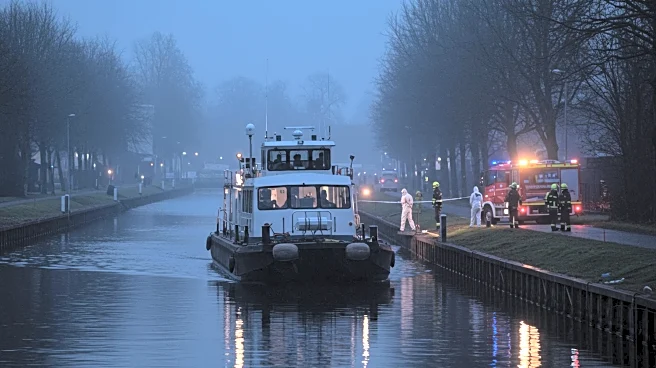What is the story about?
What's Happening?
A semi-autonomous barge, River Drone 4, has leaked approximately 10,000 liters of fuel oil into the Albert Canal near Antwerp, Belgium. The incident occurred after the barge passed through the Olen lock complex, leading to a temporary shutdown of marine traffic on the waterway. Antwerp's municipal water utility, which sources drinking water from the canal downstream of the spill, faced potential contamination risks. However, the Olen lock complex's position between the spill and the city mitigated immediate threats. A marine services company initiated a cleanup operation, using sorbent booms to contain and absorb the fuel slick. The cleanup efforts allowed marine traffic to resume by Wednesday afternoon. The Mars Food factory in Olen temporarily halted production due to strong fumes from the spill. The barge reportedly sustained a puncture in a fuel tank above the waterline, and the circumstances of the leak are under investigation.
Why It's Important?
The spill highlights the environmental risks associated with semi-autonomous maritime operations, particularly in regions where waterways are crucial for municipal water supplies and industrial activities. The incident underscores the need for stringent safety protocols and rapid response strategies to mitigate potential environmental damage. The temporary shutdown of the Mars Food factory illustrates the broader economic impact such spills can have on local businesses. Additionally, the event raises questions about the reliability and safety of semi-autonomous navigation systems, which are increasingly being adopted in the maritime industry. The investigation into the spill's cause will be critical in determining whether human error or technological failure was responsible, potentially influencing future regulatory measures.
What's Next?
Belgian authorities are investigating the circumstances surrounding the fuel leak, including whether the barge was operated by an onboard master or remotely via SEAFAR technology. The outcome of this investigation could lead to changes in operational protocols for semi-autonomous vessels. Stakeholders in the maritime industry, including operators of similar vessels, may need to reassess their safety measures and training programs. Additionally, the incident may prompt regulatory bodies to review and possibly tighten regulations governing semi-autonomous navigation to prevent future occurrences.
Beyond the Headlines
The incident raises broader questions about the integration of semi-autonomous technology in traditional industries. As automation becomes more prevalent, balancing technological advancement with safety and environmental protection becomes increasingly critical. The spill also highlights the potential for technological failures to have far-reaching consequences, emphasizing the need for robust oversight and accountability mechanisms.















